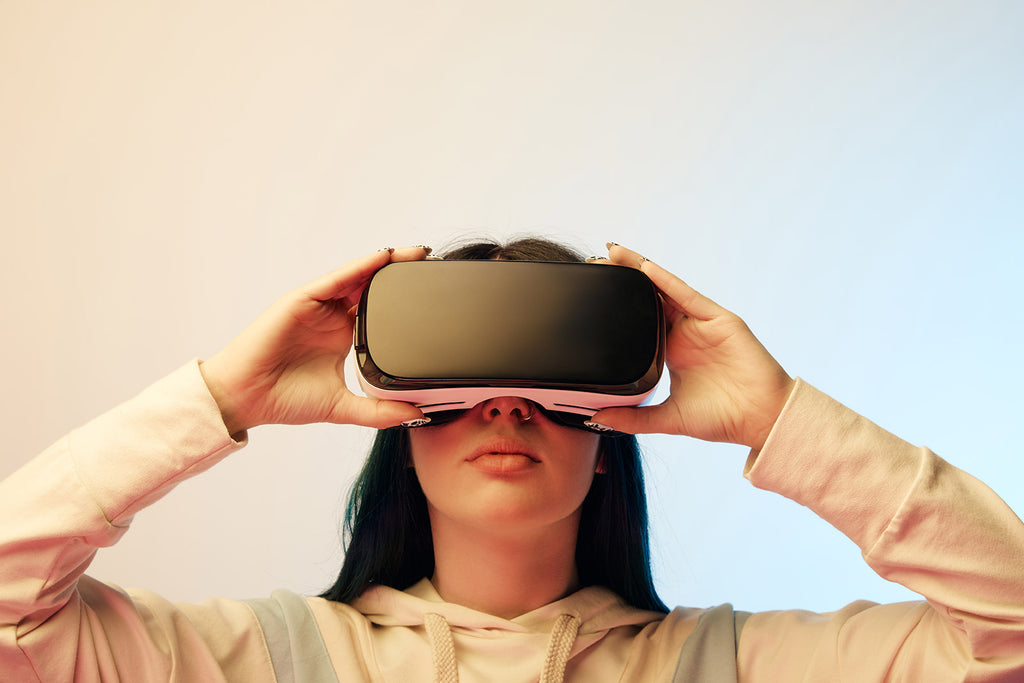Technology and mental wellbeing might seem like opposing forces.
T
he digital world certainly gets a bad rap in the health community, and technology and mental wellbeing might seem like opposing forces.
However, there are many amazing devices, apps and digital tools that can truly help us improve our health and wellbeing.
There are even smartphone apps, virtual reality solutions and other digital devices that can be used to facilitate a digital detox!
Mindfulness and technology is a growing movement in research and design that encourages the user to become aware of the present moment, rather than using technology as a form of escapism.
The focus is on redesigning and creating technology to improve the wellbeing of its users, and below is just 4 of the many ways new technology can hack our health and keep us calm.
1
Consuming conscious content on Social Media
While it’s true that social media does have the potential to damage our mental and emotional wellbeing, it can also be used as a tool to keep us calm, conscious and empowered.

It all comes down to who and what we choose to follow, as well as how we decide to interact with our digital communities.
We could all benefit from a complete social media detox now and then, but wouldn’t it be great to come back to an empowering, real and educational feed?
As a basic rule, if an account posts anything that annoys you, makes you feel bad about yourself, and offers no value to your life - unfollow!
According to the Dalai Lama (who uses Twitter!), the tools of modern life are not necessarily ‘our enemies’ in the search for mental wellbeing.
In fact, they can become our helpers if used wisely. There are many leaders in physical, psychological and spiritual wellbeing who offer education, community and relatable content on social media; you can even find Deepak Chopra on Instagram.
That said, it’s still pretty easy to find yourself mindlessly scrolling. If you do struggle with this, there are many apps and tools available to help us monitor and manage our use of social media.
As a collective, however, we’re beginning to realise that we each have the power to mindfully curate what we see and share on social media. Social media can be an incredibly empowering technology when used in a healthy way.
Poor vagal tone is associated with inflammation, anxiety and depression
2
Measuring Heart Rate Variability (HRV) and ‘Vagal Tone’
Heart Rate Variability (HRV) is the variation in the time interval between consecutive heartbeats in milliseconds. This phenomenon is influenced by exercise, hormonal reactions, metabolic processes, cognitive processes, stress and recovery, and it’s emerging as one of the most important health markers.
Our HRV will naturally increase when we are relaxed and decrease during times of physical or mental stress. However, with chronic stress and poor health, it’s possible to have a low HRV when you’re trying to relax - and this is an alarm bell urging you to make some changes!
A higher HRV is associated with reduced morbidity and mortality, improved psychological well-being, and overall better quality of life.
This is also known as an increased vagal tone, which refers to the activity of the 10th cranial nerve - the vagus nerve.
This nerve is a crucial part of the parasympathetic nervous system, and not only does it impact the function of almost every system in the body, but poor vagal tone is associated with inflammation, anxiety and depression.
So naturally, many amazing pieces of technology have emerged in the space of tracking HRV and improving our vagal tone. Lief, for example, is one of the most advanced and effective tools for teaching us our stress-based responses, along with products such as CorSense and HeartMath.
Non-invasive vagus nerve stimulation technology is also becoming more widely available to treat illnesses associated with poor vagal tone. The future of health technology is very exciting!
3
Gamified mindfulness and stress awareness
For the new meditator, technology provides many excellent tools for taking the first steps. Interestingly, the technology that teaches mindfulness and stress awareness by turning it into a game is the most effective. This is known as gamification, and it works because it triggers real, powerful human emotions.

When we’re stressed, and in need of a distraction, we’re much more likely to turn to games than to start learning meditation. We seek instant results and rewards; that’s just human nature!
With this in mind, it’s easy to see why technology combining mindfulness with immediate rewards has been so successful. HeadSpace is one super successful app that comes to mind!
These days there are many gamified tools for learning meditation, as well as monitoring and managing stress. The Muse2 meditation headband uses EEG technology to translate your mental activity into the guiding sounds of weather to help you find focused calm. Busy mind? You get stormy weather. Calm mind? You get pleasant weather and chirping birds. Muse coaches the user through breathing techniques and provides real-time feedback to help you calm your mind.
Did you know that the pores on your fingertips are extremely sensitive to changing levels of stress? Pip is another gamified tool that captures these changes in your fingertips by detecting electrodermal activity (EDA) and allows you to visualise these changes through biofeedback communication with an app.
The audio and visual feedback helps people become more aware of their stress levels while learning to reduce them in a fun and engaging way.
Researchers have been developing virtual reality systems that help people overcome specific phobias
4
Virtual Reality games for emotional and mental health
Virtual Reality (VR) has reached new heights of sophistication in recent years, and the mental health community has jumped on board.
Researchers have been developing virtual reality systems that help people overcome specific phobias as early as the 1990s. Since then, VR therapy has expanded to address more complex anxiety disorders, such as social anxiety and post-traumatic stress, and even the anxiety associated with paranoid schizophrenia.
An exciting collaboration between a team of scientists at the Radboud University and the Games for Emotional and Mental Health Lab has resulted in the creation of Deep. Deep is a VR game that allows players to navigate through a serene underwater world.
Movement is controlled by slow, deep breathing which helps to relieve anxiety in the player. Using biofeedback mechanics and a self-explorative, visually stunning underwater seascape, Deep teaches players valuable emotional regulation techniques in a safe and fun environment. All you need is the custom controller to strap around your diaphragm and an Oculus Rift VR headset.
New technology is exciting, but it’s not necessary for your wellbeing
We really can enhance our mental and emotional health with the help of technology, but that doesn’t mean we all need to use it.
Do you rely on technology such as devices, apps, and virtual reality? Or do you prefer the more traditional approaches to health and wellness? Either way, it doesn’t really matter; what’s important is that we focus on our mental wellbeing at least once a day.
It doesn’t matter what our personal self-care choices are; it just matters that we make time for them, even if it’s just a couple of minutes each day!
So go out and journal in the forest or stay in with your VR therapy games - both will do the job.





